Tidbits- June 5-Reader Comments: Freedom Flotilla Sets Sail; That’s Antisemitism; What Would Recognizing Palestine Really Mean; RFK Jr. Broke 60 Years of Vaccine Decision-Making; the Upside-Down Priorities of House Budget – the Black Left & Labor…
-
That's Antisemitism -- Cartoon by Dr. James MacLeod
-
TACO -- Cartoon and Commentary by Rob Rogers
-
Freedom Flotilla Sets Sail for Gaza Carrying Aid and Demands: ‘End Blockade. End Genocide’ (Rob Prince)
-
What Would Recognizing Palestine Really Mean? (Daniel Millstone; Nora Lapin; Sarito Carol Neiman)
-
Cash Only -- Cartoon by Mike Luckovich
-
How RFK Jr. Broke 60 Years of Vaccine Decision-Making Process (Aaron Stephens)
-
Deposit bribe, choose grift! It’s that easy with MAGA’s new Corrupt-O-Matic® -- Cartoon by Lalo Alcaraz
-
Trump’s New ‘Gold Standard’ Rule Will Destroy American Science As We Know It (Eleanor Roosevelt)
-
Linda McMahon Unsure if Teaching Black History Flouts Trump’s Anti-DEI Policy (Gayle Matthews Martz)
-
Word Gets Around -- Cartoon by David Cohen
-
Trump Pardons Drug Kingpins Even As He Escalates U.S. Drug War Rhetoric (Karen Lee Wald)
-
Elizabeth Gurley Flynn Reminds Us How Civil Liberties and Collective Action Go Hand in Hand (Elaine Harger)
-
Seeking New Foods, Scientists Look to Bacteria, Algae, and More (Helen Finkelstein)
.
Resources:
- The Upside-Down Priorities of House Budget: Adding significantly to debt while reducing incomes for bottom 40% - An open letter from six Nobel laureate economists (Daron Acemoglu; Peter Diamond; Oliver Hart; Simon Johnson; Paul Krugman; Joseph Stiglitz / Economic Policy Institute)
.
Announcements:
-
The Black Left & Labor: What are we doing? -- Webinar -- (M4BL | NBWC | EAT | LNS)
-
What's Next for Rojava and Kurdish Freedom Movement? -- Webinar -- (Emergency Committee for Rojava)
-
That's Antisemitism -- Cartoon by Dr. James MacLeod

Dr. James MacLeod
June 2, 2025
MacLeodCartoons
TACO -- Cartoon and Commentary by Rob Rogers
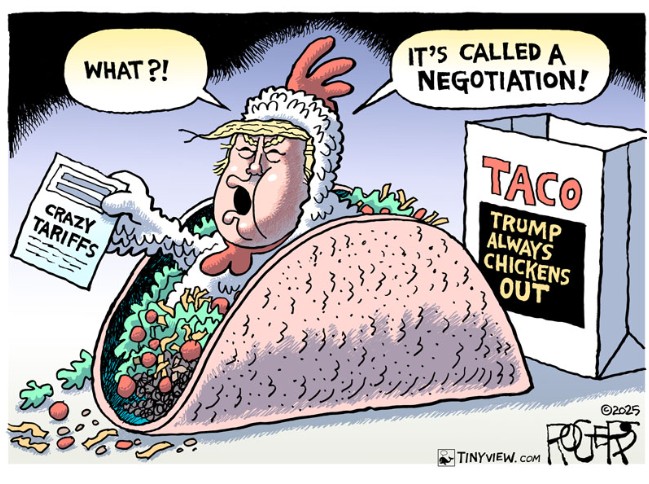
Trump was offended when a reporter asked him about his new tariff/trade nickname, "TACO". It stands for Trump Always Chickens Out (when it comes to trade). For a guy who regularly gives people cruel and offensive nicknames, Trump sure has a thin skin. Or is that a soft shell?
Rob Rogers
June 3, 2025
TinyView
Freedom Flotilla Sets Sail for Gaza Carrying Aid and Demands: ‘End Blockade. End Genocide’
Here is an example of principle, courage, and concern for fate of earth, fate of humanity all rapped up in one young woman who has proven she's a lot more than a media icon.
Rob Prince
What Would Recognizing Palestine Really Mean?
IMO, obviously, there are but two solutions to Israeli-Palestinian conflict. A single, binational state with liberty and justice for all or two states. Will either emerge from current carnage? Judging by past? No. Here, via Portside, an essay laying out what a two-state solution might look like.
Daniel Millstone
Post on Facebook
=====
I admire Peter Beinhart who calls for a one state solution. But you would obviously need to get rid of Netanyahu to do that.
Nora Lapin
Posted on Portside's Facebook page
=====
It's a bit late for all that, apparently.
Poll: 82% of Israelis want to expel Palestinians from Gaza; 47% want to kill every man, woman, child
A poll found 82% of full citizens of Israel want to expel Palestinians from Gaza. 47% want to kill every single man, woman, and child. Ex PM Ehud Olmert said Israel is waging a "war of extermination".
https://www.geopoliticaleconomy.report/p/poll-israelis-expel-palestinians-gaza-genocide
Sarito Carol Neiman
Cash Only -- Cartoon by Mike Luckovich

Mike Luckovich
May 29, 2025
Atlanta Journal-Constitution
How RFK Jr. Broke 60 Years of Vaccine Decision-Making Process
Mr. Death. Angel of Death.
Aaron Stephens
Posted on Portside's Facebook page
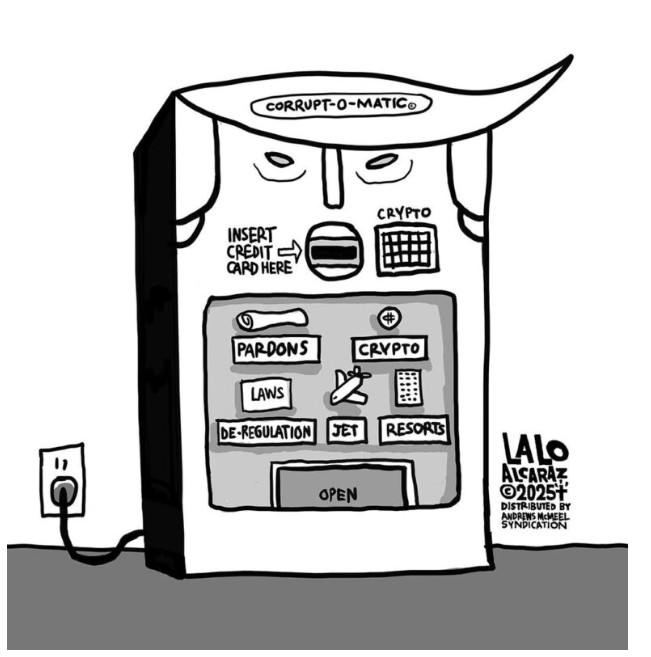
Lalo Alcaraz
May 31, 2025
https://www.pocho.com/
Trump’s New ‘Gold Standard’ Rule Will Destroy American Science As We Know It
Remember "Aryan science?" Same deal. Call them what they are.
Eleanor Roosevelt
Linda McMahon Unsure if Teaching Black History Flouts Trump’s Anti-DEI Policy
McMahon has no clue about education. She's just another worthless appointee from Trump administration.
Gayle Matthews Martz
Word Gets Around -- Cartoon by David Cohen
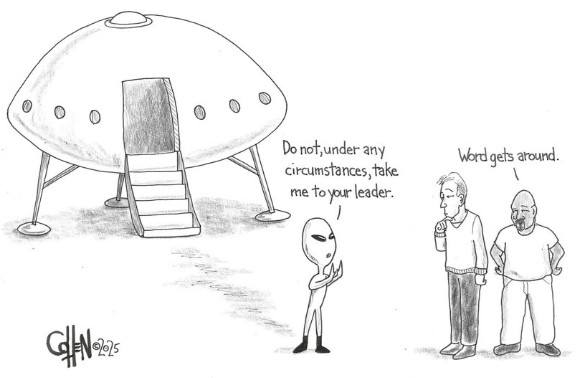
David Cohen
June 1, 2025
David Cohen
Trump Pardons Drug Kingpins Even As He Escalates U.S. Drug War Rhetoric
Does it occur to anyone else that reason drug kingpins and big time dealers are getting released at a greater rate than other prisoners is that they have more money— lots more— to spend paying lobbyists and others??
Karen Lee Wald
Elizabeth Gurley Flynn Reminds Us How Civil Liberties and Collective Action Go Hand in Hand
EGF makes a cameo appearance in _The Cold Millions_ by Jess Walter, a Spokane author. She's not forgotten here!
Elaine Harger
Seeking New Foods, Scientists Look to Bacteria, Algae, and More
(posting on Portside Culture)
The new foods described in article all require machinery running on a power source. That would put them out of reach for poorest people, and also contribute to climate crisis. But a field of grain or a pasture for livestock are solar-powered.
Helen Finkelstein

As economists who have devoted our careers to researching how economies can grow and how the benefits of this growth can be translated into broadly shared prosperity and security, we have grave concerns about the budget reconciliation bill passed by the U.S. House of Representatives on May 22, 2025.
The most acute and immediate damage stemming from this bill would be felt by the millions of American families losing key safety net protections like Medicaid and Supplemental Nutrition Assistance Program (SNAP) benefits. The Medicaid cuts constitute a sad step backward in the nation’s commitment to providing access to health care for all. Proponents of the House bill often claim that these Medicaid cuts can be achieved simply by imposing work reporting requirements on healthy, working-age adults. But healthy, working-age adults are by definition not heavy consumers of health spending, so achieving the budgeted Medicaid cuts will obviously harm others as well.
Medicaid provides health insurance coverage for low-income Americans, but this includes paying out-of-pocket health costs for low-income retired Medicare recipients and providing nursing home and in-home care services for elderly Americans. Medicaid also covers 41% of all births in the United States, including over 50% of all births in Louisiana, Mississippi, New Mexico, and Oklahoma. Work reporting requirements will obviously yield no savings from these Medicaid functions.
Besides providing affordable health care to families, Medicaid is also crucial to state budgets and hospital systems throughout the country—particularly in rural areas. In 2023, the federal government sent $615 billion to state governments to cover Medicaid spending; this federal contribution accounted for over 75% of total state Medicaid spending in more than 19 states. Rural hospitals in states that accepted the Medicaid expansion that was part of the Affordable Care Act were 62% less likely to close than rural hospitals in non-expansion states.
In addition to Medicaid, the House bill also significantly cuts SNAP. These steep cuts to the social safety net are being undertaken to defray the staggering cost of the tax cuts included in the House bill, including the hidden cost of preserving the large corporate income tax cut passed in the 2017 tax law. But even these sharp spending cuts will pay for far less than half of the tax cuts (not even including the cost of maintaining the corporate income tax cuts of the 2017 law).
U.S. structural deficits are already too high, with real debt service payments approaching their historic highs in the past year. The House bill layers $3.8 trillion in additional tax cuts ($5.3 trillion if all provisions are made permanent) on top of these existing fiscal gaps—and these tax cuts are overwhelmingly tilted toward the highest-income households. Even with the safety net cuts, the House bill leads to public debt rising by over $3 trillion in coming years (and over $5 trillion over the next decade if provisions are made permanent rather than phasing out). The higher debt and deficits will put noticeable upward pressure on both inflation and interest rates in coming years.
The combination of cuts to key safety net programs like Medicaid and SNAP and tax cuts disproportionately benefiting higher-income households means that the House budget constitutes an extremely large upward redistribution of income. Given how much this bill adds to the U.S. debt, it is shocking that it still imposes absolute losses on the bottom 40% of U.S households (if some of the fiscal cost is absorbed in future bills with extremely high and broad tariffs, the share of households seeing absolute losses will increase rapidly).
The United States has a number of pressing economic challenges to address, many of which require a greater level of state capacity to navigate—capacity that will be eroded by large tax cuts. The House bill addresses none of the nation’s key economic challenges usefully and exacerbates many of them. The Senate should refuse to pass this bill and start over from scratch on the budget.
Join EPI's open letter from economists rejecting destructive reconciliation bill
Please note: This letter is intended to be exclusively for individual economists to lend their name to opposing this bill. In form below, we ask for some identifying details in order to help verify your identity. Thanks for your patience with extra steps - it's important to try to avoid anyone signing on using your public email without your permission!
The Black Left & Labor: What are we doing? -- Webinar -- (M4BL | NBWC | EAT | LNS)
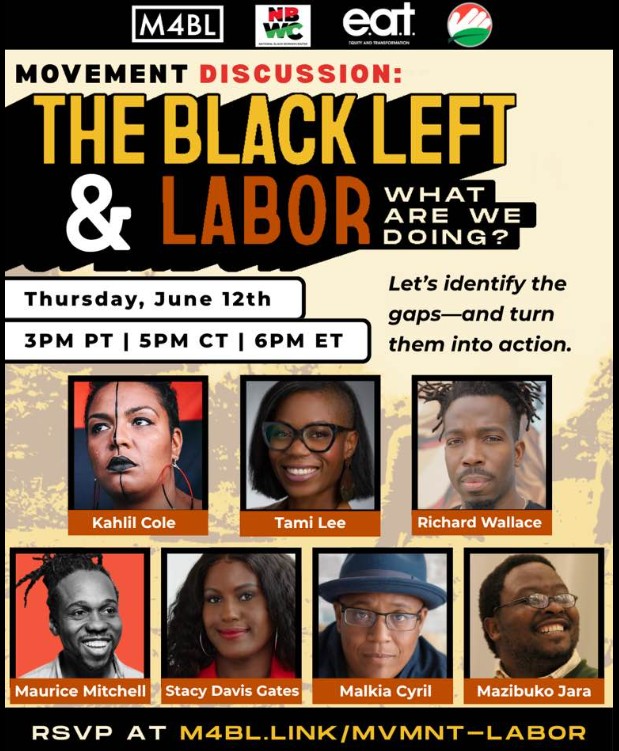
Jun 12, 2025 06:00 PM EDT
Join us as we create a space to name tensions in our movement, confront our conditions, and get clear on how we fight, escalate, and organize in a time of deep political and economic upheaval.
We’re not just reflecting—we’re strategizing.
Let’s identify gaps—and turn them into action.
What's Next for Rojava and Kurdish Freedom Movement? -- Webinar -- (Emergency Committee for Rojava)

Recent events throughout Kurdistan have opened up dramatic new possibilities for the future of Rojava and the broader Kurdish freedom movement. Between the fall of Assad, inter-Kurdish unity talks, the formal dissolution of the PKK, and direct political negotiations in both Syria and Turkey, the future remains uncertain as the regional balance of forces shifts, and all parties come to the negotiating table.
Will the DAANES solidify its gains and secure its autonomy in negotiations with Damascus? Will Kurds finally win political rights within Turkey? Will fragile ceasefires hold?
To discuss these questions, and much more, we are hosting a conversation with Meghan Bodette, Director of Research at the Kurdish Peace Institute, who will be joining us on the ground in Kurdistan to offer updates and answer questions.
If you'd like to support Emergency Committee for Rojava or learn more about Rojava, visit our website, defendrojava.org, or email us at info@defendrojava.org.

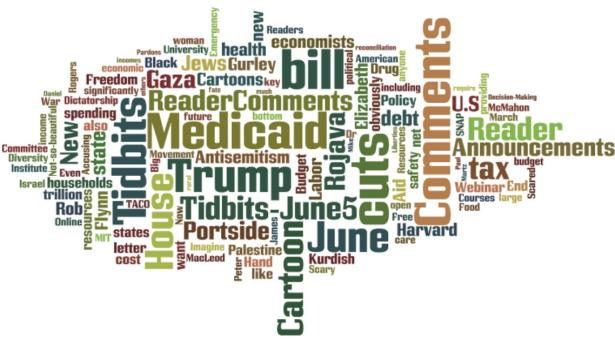
Spread the word